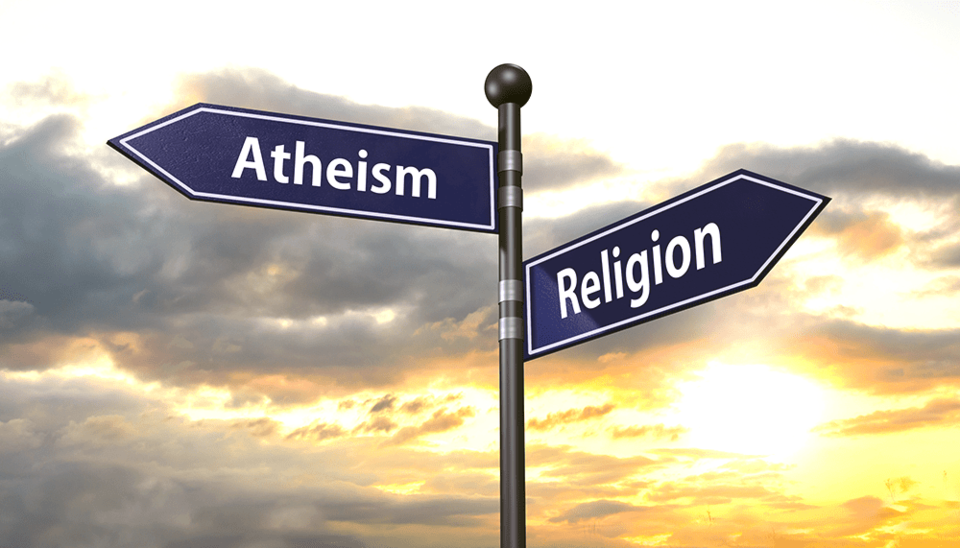The Church of what, now?
The Church of Atheism is an oxymoron. Like negative growth, or a conspicuous absence, or a working vacation.
I’m not saying there can’t be such a thing as a devout atheist, but the idea of a bunch of them congregating inside a church to pray to a vacuum is a stretch.
And yet such a church exists and has recently applied for charitable status, so it can reap tax benefits like other religious organizations. It feels it should enjoy the same rights as a normal church.
That locust cloud of rights again.
In any case, the court rejected its claim, deciding that a church without a god isn’t really a church at all. And, because this institution professes no faith in anything except an absence of faith, and it provides no comfort or solace to its congregation in the way that real churches do, it can’t be granted charitable status.
The case reminded me of The Apathy Club at my university. During Frosh Week the various student clubs and organizations set up their booths around the campus to lobby undergraduates to join. Among the debating clubs, chess clubs, activist groups and the school newspaper was the Apathy Club, inviting membership from all students who identified as indifferent to absolutely everything.
To no one’s surprise, the Apathy Club quickly folded “due to lack of interest.”
In England and Wales the number of people who declare they have no religion has risen by six million since 2001, making those two countries among the least religious in the western world. In the UK as a whole, only 21 percent claim religion to be important in their lives, while in Canada the figure is 29%. Atheism, and its less assured cousin agnosticism, are on the rise.
It’s my belief—if I can phrase it that way—that a true atheist, as opposed say to someone who just thinks it’s cool, arrives at their position after much reflection and serious reading. The writings of Bertrand Russell, Richard Dawkins, and Christopher Hitchens give one pause for thought, which was exactly their intent. To invite us to think. Anyone would have to think very hard about their reasons for buying into oblivion. It’s an all-or-nothing throw of the dice. A zero sum game, as they say, for there’s no tomorrow.
But the idea of atheists needing to club together to celebrate their unbelief strikes me as kind of odd. Why join a group when you’ve decided to go it alone?
My experience with churches is that they offer a community to like-minded members. They provide hope for the hopeless, companionship for the lonely, and charity for the dispossessed. History tells us it wasn’t always this way. Centuries of wars in the name of religion attest to its dark side. Jonathan Swift wrote in 1727, “We have just enough religion to hate each other, but not enough yet to love each other.”
I leave it to others to determine if relations between Christians, Muslims, Jews, Sikhs, Hindus around the world have improved since then.
My other experience with churches is that they like to expand their portfolio, increase their flock numbers by signing on new clients.
I suppose there’s nothing wrong with converting people as long as you have something to offer. Light in the darkness, for example. Telling people they’ll live forever is good news indeed. That’s a no brainer.
Believing that death is only the beginning gives those who get a raw deal in this life hope of a better one in the next, as long as they play their cards right.
But so far from having a light to offer the benighted, the Church of Atheism has little to offer except more darkness. Some, like Mark Twain, find the thought of oblivion comforting. “I don’t fear death,” he said, “because I was dead for a million million years before I was born, and was not at all inconvenienced by it.”
The Church of Atheism holds Sunday morning services for the once-religious who now feel they’re missing out on something. They sing pop hits like, “Don’t Stop Me Now,” and listen to talks on science and reason and objective truth to bolster their belief in non-belief.
As a non-believer myself I’ve no desire to surround myself with other ones. Should I meet another non-believer on my own, I would hope to engage in a lively and civil discussion about how we came to this pass. It’s not that, like Groucho, I wouldn’t belong to any club that would have me as a member, but I regard my personal credo as a private matter. I’ve never been comfortable with groupthink. I’ve worked hard to arrive at non-belief and will continue to do so because the matter is never settled. But I don’t see how standing in a circle holding hands with others and singing, “It Ain’t Necessarily So,” or, “Imagine,” or, “Shallow Be Thy Name,” will help me.
And that, by the way, brings up one of the great glories of Christianity, for faithful and skeptic alike.
The music.
When I hear Handel’s Messiah, the masses of Bach, Haydn and Mozart, I’m deeply moved. I love the music, and the poetry, even though I don’t share the sentiment.
As well, Christianity has given us some of our greatest architecture, painting and sculpture over the past millennium. You don’t have to be a believer to appreciate the art any more that the artists themselves had to be believers to create it.
I don’t in any way deny the Church of Atheist’s right to exist, though I remain skeptical of its right to seek out others to convert. And as for the court’s decision to deny it charitable status, I believe it was the right one.
In the end, they didn’t have a prayer. ♦



